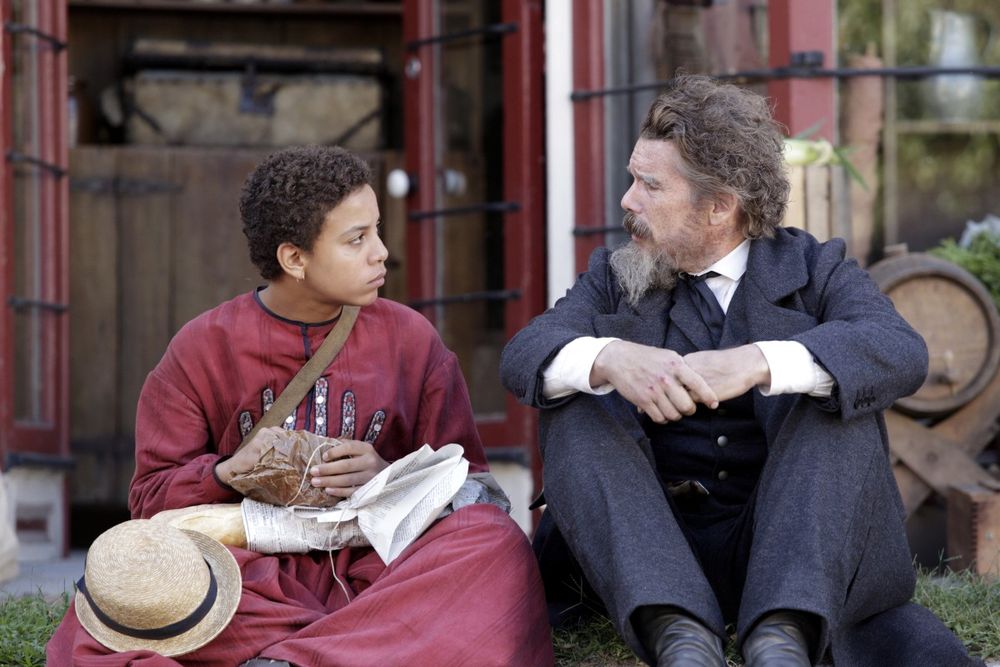In Hollywood, White people love casting themselves as heroes, historical accuracy be damned. You’ve seen the trope before: the White saviors in film and television who, in one way or another, always manage to swoop in and save the day, uplifting (or outright liberating) Black folks left and right. How rewarding it must feel to watch characters who are so… redeemable. Showtime’s The Good Lord Bird, which wrapped on Sunday, could have all too easily succumbed to that facepalm-worthy pitfall — but instead, the miniseries soars by challenging depictions of White allyship to do better at a time in which the message is especially needed.
Brown was a fucking loon, and Hawke’s depiction of him as an obsessive, spazzed-out, furious evangelical is out of this world. But he was a loon who was spot-on in his shaming of American hypocrisy.
The seven-episode saga, based on James McBride’s 2013 antebellum novel by the same name, unfolds from the perspective of a formerly enslaved boy named Henry Shackleford (played by Joshua Caleb Johnson), who tells of his encounters with abolitionist John Brown (Ethan Hawke). The two characters meet just before Brown kills a slave owner in a bloody saloon shoot-out; Shackleford (aka Little Onion) then joins the ranks of Brown’s militia, which seeks to spark a slave revolt in the years before the Civil War.
Be clear: Brown was a fucking loon, and Hawke’s depiction of him as an obsessive, spazzed-out, furious evangelical is out of this world. But he was a loon who was spot-on in his shaming of American hypocrisy, loudly preaching the gospel of the eradication of slavery in the States.
The show, as with its real-life subject, raises questions. Can a White man actually lead Black people toward liberation? Can revolution be sparked based solely on the id of a wild dude? Is Hawke really about to squander all of the Black goodwill he accrued via Training Day by playing a White savior? Thankfully, a stellar script written by the consortium of Hawke, Erika L. Johnson, and Mark Richard constantly challenges Brown’s philosophy and self-righteousness.
Brown is loud about who he is — and in being so comes across as some mix of Quentin Tarantino and Walt Whitman. He introduces himself with pomp and theatricality: “My name is Captain Osawatomie John Brown and I am here to defeat slavery in the name of the Great King of Kings, the Holy Redeemer, the man of Trinity because He is on the side of justice and you are on the side of chains.” He trudges through bullet-riddled White bodies, boots through settled snow. If you were a slaver in his midst, you knew you were in for a killing.
All of this may sound hella self-righteous. The Good Lord Bird makes no bones about the kind of person it took to light a fire under pale asses. As such, the series dabs in violence for purposes both comedic (a cannonball miraculously cutting a man in half just as Brown is praying for divine protection) and harrowing (the fateful raid on Harpers Ferry). But the series stops short of depicting Brown as wholly messiah or madman. And, more importantly, it remains true to historical record, showing Black people leading themselves to freedom (see: Zainab Jah’s resounding performance as General Harriet Tubman).
In the series’ fifth episode, “Hiving the Bees,” Onion and the freed Black men he recruits for the aforementioned raid make it very clear that they’re choosing to do so. As free people. Frederick Douglass (Daveed Diggs) and the rest wrestle with what it means to fight for Black people across the country who they will never know. Onion contemplates what it might mean to die and never be intimate.
These worries feel real — and although the series primarily focuses on the cult figure, these dalliances with Black cognition give a sense that the show actually cares about Black people. There are odd choices, no doubt: Onion revealing his manhood for the first time (“I’m a man”) after pining for the attention of a White girl earned an eye roll. But even in that, the choice was his; no one led him there. Just as Brown never leads Black people to their freedom. He’s forced to listen. They push back against Brown’s scatterbrained strategies. Douglass declares that Brown could never know what the Negro wants. Onion refuses to use a gun. The show is rife with scenes of Brown having to shut the hell up sometimes and consider the gravity of his mission.
Brown was a man who knew death was always near, waiting for a man or a state with enough power and acumen to either outwit or overwhelm him. Engaging with death constantly, in some cases inflicting it and in others grieving its omnipotence, allowed Brown to understand the significance of his own. A White, ostensibly Christian man dying at the hands of the state because he believed that the Constitution was a brazen lie as long as slavery was law. Brown knew his death was imminent — when he was imprisoned, the guards didn’t even have to lock his cell — and that it signaled a coming war. Brown was no prophet, but he understood how faulty the country’s moral compass was, its citizens misoriented toward bigotry and hate.
The Good Lord Bird is a reminder that White people — even those most fervently on the side of Black liberation — are no saviors for us. If anything, they are sounding boards, sources for experiences within the White world that can be used to strategize for all of our freedom. Brown was self-aware enough to know that his neurosis provided him a level of fearlessness that people would write novels and make shows about. But all of that glory had to be in service to freedom. Brown did not lead, but he also did not fail.
